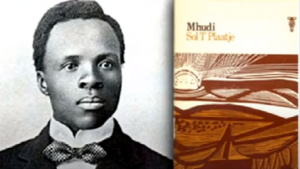Anti-apartheid activist and journalist Tshekisho Solomon Plaatje has been lauded as a game-changer in the field of journalism, especially for promoting news writing in vernacular languages. Plaatje founded the first Black-owned bilingual newspaper, Koranta Ea Becoana in 1901 in Mafikeng, published in English and Setswana.
Song and dance took centre stage as Sol Plaatje’s life and legacy was celebrated at the Sol Plaatjie Memorial Lecture in Mahikeng, 88 years after his death at the age of 56.
Pen and paper are among the tools the renowned journalist and author used to fight apartheid.
Author and biographer of Sol Plaatje, Sabata Mpho-Mokae says Plaatjie used literature to fight injustices of the past.
“He used literature to fight against the injustices of the past, which was extremely important because at that time he was addressing the outside world, informing them of what was happening in South Africa. He was hoping there would be pressure from outside against the SA government.”
Language experts have commended Plaatje’s efforts to promote and develop Setswana. First Setswana PHD holder Dr Elizabeth Pooe says whatever Plaatjie did, he did to develop and grow Setswana.
“Whatever that he was doing, he was doing in order to develop Setswana and make it grow. In contributing as a journalist, as an interpreter, as an author; whatever he did, he was doing that in order to raise funds to develop his language, Setswana.”
Chairperson of the North West Provincial Language Committee, Goitsemodimo Seleka says Plaatje paved the way for Setswana writers.
“The establishment of a Setswana newspaper back then during the times of Sol Plaatje and when we celebrate 100 years of Mhudi … it’s an indication that Batswana have a foundation in journalism; Batswana have a foundation in language and in promoting their language.”
MEC for the North West Department of Arts & Culture, Virginia Tlhapi says South Africa needs more brave journalists and writers like Plaatje who wrote stories without fear or favour.
“Sol Plaatje is one of the best journalists we’ve ever had in SA because he wrote history as it was without editing it, without favouring anyone. So, I think we need more journalists like him – those who will write our history as Africans, those who will write what we are going through. So, we really need such journalists and we need our journalists to be free.”
Those who attended the memorial lecture praised the work of Plaatjie.
The memorial lecture coincides with the centenary of Sol Plaatje’s first English novel, Mhudi.



